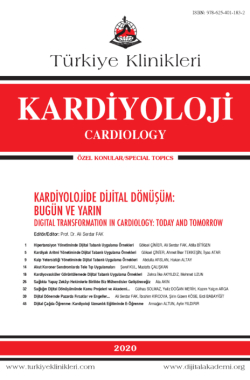Learning in the Digital Age: E-Learning in Cardiology Specialization Training
Armağan ALTUNa,b, Aylin YILDIRIRa,b
aBaşkent Üniversitesi Tıp Fakültesi, Kardiyoloji ABD, Ankara, TÜRKİYE
bBaşkent Üniversitesi İstanbul Sağlık Uygulama ve Araştırma Merkezi, Kardiyoloji ABD, İstanbul, TÜRKİYE
Altun A, Yıldırır A. Dijital çağda öğrenme: Kardiyoloji uzmanlık eğitiminde e-öğrenme. Fak AS, editör. Kardiyolojide Dijital Dönüşüm: Bugün ve Yarın. 1. Baskı. Ankara: Türkiye Klinikleri; 2020. p.45-50.
ABSTRACT
Digital cardiologists are cardiologists who can use digital media in clinical practice, education, and interaction with patients. Although digital tools are supportive of education, they cannot replace human thoughts and feelings. On the other hand, it is useful to arrange the core training program of cardiology in a way to train digital cardiologists of the future. Educators lacking this opportunity during their training should adapt quickly to e-learning. Blended use of e-learning and face-to-face learning seems to be the most effective way. In this way, the trainer will transfer his experiences on one hand and on the other hand, he will enable the learner to acquire lifelong learning habit by supporting the selflearning activity with the e-learning opportunities.
Keywords: Digital age; e-learning; cardiology; education
Kaynak Göster
Referanslar
- Dent jA, harden RM. Digital medical education. A practical guide for Medical Teachers. 4th ed. Churchill Livingstone. Elsevier 2013. p. 221-30.
- Onan A, gürpınar E. Tıpta E-öğrenme. Sayek İ, editör. Tıp Eğiticisi El Kitabı. 1. Baskı, Ankara: güneş Kitabevi; 2016. p. 195-202.
- Ellaway R, Masters K. AMEE guide 32. Elearning in medical education. part 1: Learning, teaching and asessment. Medical Teacher. 2008;30:455-73. [Crossref] [PubMed]
- Harden R, Laidlaw jM. E-learning. Essential Skills for a Medical Teacher. 2nd ed. Elsevier 2016. p.203-9.
- Rosello X, Stanbury M, Beeri R, Kirchhoff p, Casadei B, Kotectha D. Report from ESC Education Conference 2018. Digital learning and future cardiologist. Eur heart j. 2019;40: 449- 507. [Crossref] [PubMed]
- Yıldırır A, Altun A, Ural D, özdemir M, Aslan ö, Müderrisoğlu h. The opinion and recommendations of Turkish Board for Accreditation in Cardiology on Board Examination. Turk Kardiyol Dern Arş. 2019;47:549-51. [Crossref] [PubMed]
- Altun A. Türkiye'deki kardiyoloji uzmanlık eğitiminin sorunları. Türk Kardiyol Dern Arş. 2012;40:276-81 [Crossref] [PubMed]
- Yıldırır A, Altun A, özdemir M, Aslan ö, Müderrisoğlu h. Uzmanlık eğitiminde web tabanlı eğitim sistemi uygulaması. X.Ulusal Tıp Eğitimi Kongresi, İzmir, 9-12 Mayıs 2018.
- Lerman K. Social Information processing in News Aggregation. IEEE Internet Computing. 2007;11:16-28. [Crossref]
- Breining g. Future or fad? virtual reality in medical education Association of American Medical Colleges: Association of American Medical Colleges News; 2018[August 28, 2018]. [Link]
- Southworth M, Silva jR, Silva jNA. Use of extended realities in cardiology. Trends Cardiovasc Med. 2020;30:149- 50. [Crossref] [PubMed] [PMC]
- Maresky hS, oikonomou A, Ali I, Ditkofsky N, pakkal M, Ballyk B. virtual reality and cardiac anatomy: Exploring immersive three‐dimensional cardiac imaging, a pilot study in undergraduate medical anatomy education. Clin Anat. 2019;30:238-43. [Crossref] [PubMed]

